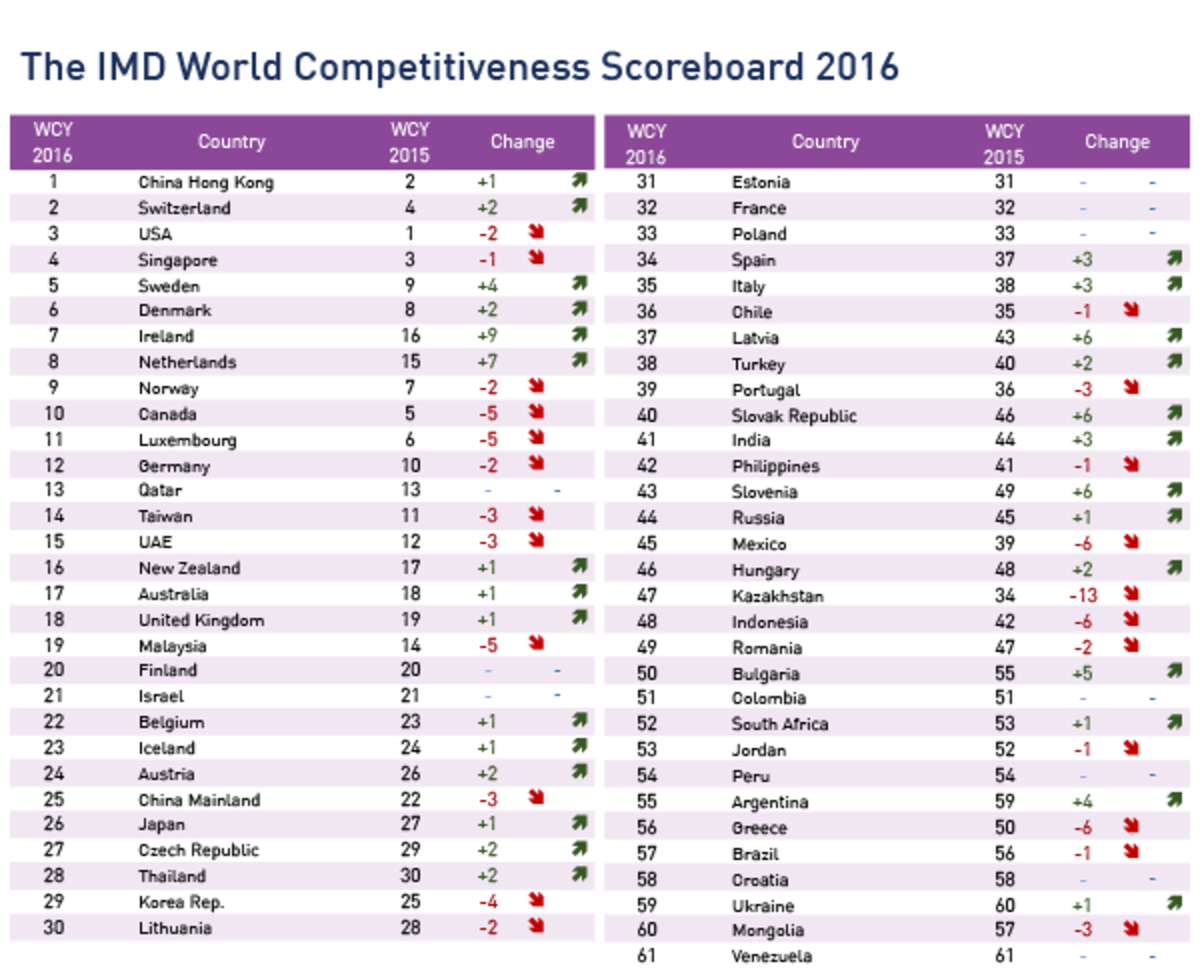

IMD World Competitiveness Center today, on 30 May 2016, announced its annual world competitiveness ranking. According to it, USA has surrendered its status as the world’s most competitive economy after being overtaken by China Hong Kong and Switzerland. The 2016 edition ranks China Hong Kong first, Switzerland second and the USA third, with Singapore, Sweden, Denmark, Ireland, the Netherlands, Norway and Canada completing the top 10.
Professor Arturo Bris, Director of the IMD World Competitiveness Center, said a consistent commitment to a favourable business environment was central to China Hong Kong’s rise and that Switzerland’s small size and its emphasis on a commitment to quality have allowed it to react quickly to keep its economy on top. He marked, “The USA still boasts the best economic performance in the world, but there are many other factors that we take into account when assessing competitiveness.”
“The common pattern among all of the countries in the top 20 is their focus on business-friendly regulation, physical and intangible infrastructure and inclusive institutions.” For example, a leading banking and financial center, China Hong Kong encourages innovation through low and simple taxation and imposes no restrictions on capital flows into or out of the territory.
Taiwan, Malaysia, Korea Republic, and Indonesia have all suffered significant falls from their 2015 positions, while China Mainland declined only narrowly retaining its place in the top 25. China Hong Kong and Singapore aside, however, the research suggests Asia’s competitiveness has declined markedly overall since the publication of last year’s ranking.
Research of the year 2016 shows that among European countries the best gains experiences Latvia, the Slovak Republic and Slovenia. In comparison with the last year, Latvia moved up in the ranking from 43 (2015) to 37. Neighbouring Lithuania has also slightly improved results (28 to 30), whereas Estonia remains at the same position (31).
Western European economies have also continued to improve, with researchers highlighting the ongoing post-financial-crisis recovery of the public sector as a key driver.
Each ranking is based on analysis of over 340 criteria derived from four principal factors: economic performance, government efficiency, business efficiency and infrastructure. Responses from an in-depth survey of more than 5,400 business executives, who are asked to assess the situation in their own countries, are also taken into consideration.
Data gathered since the first ranking was published more than 25 years ago also lend weight to fears that the rich are getting richer and the poor poorer, said Professor Bris.
“Since 1995 the world has become increasingly unequal in terms of income differences among countries, although the rate of increase is now slowing,” he said. “The wealth of the richest countries has grown every year except for the past two, while the poorer countries have seen some improvement in living conditions since the millennium. Unfortunately, the problem for many countries is that wealth accumulation by the rich doesn’t yield any benefits for the poor in the absence of proper social safety nets. Innovation-driven economic growth in poorer countries improves competitiveness, but it also increases inequality. This is obviously an issue that demands long-term attention.”
IMD World Competitiveness Yearbook 2016 Results:
Competitiveness trends in Latvia
Competitiveness trends in Latvia (short version)
More information on the website of IMD WCC: https://worldcompetitiveness.imd.org
Source: The IMD World Competitiveness Center

 LU konference
LU konference